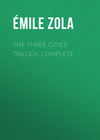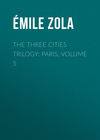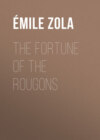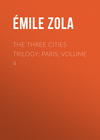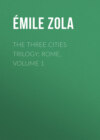Read the book: «The Three Cities Trilogy: Paris, Complete», page 8
When Pierre got as far as the Summer Circus he was much surprised at again seeing Salvat, the journeyman engineer, on one of the avenue seats. He must have sunk down there, overcome by weariness and hunger, after many a vain search. However, his jacket was still distended by something he carried in or under it, some bit of bread, no doubt, which he meant to take home with him. And leaning back, with his arms hanging listlessly, he was watching with dreamy eyes the play of some very little children, who, with the help of their wooden spades, were laboriously raising mounds of sand, and then destroying them by dint of kicks. As he looked at them his red eyelids moistened, and a very gentle smile appeared on his poor discoloured lips. This time Pierre, penetrated by disquietude, wished to approach and question him. But Salvat distrustfully rose and went off towards the Circus, where a concert was drawing to a close; and he prowled around the entrance of that festive edifice in which two thousand happy people were heaped up together listening to music.
V. FROM RELIGION TO ANARCHY
AS Pierre was reaching the Place de la Concorde he suddenly remembered the appointment which Abbe Rose had given him for five o’clock at the Madeleine, and which he was forgetting in the feverishness born of his repeated steps to save Laveuve. And at thought of it he hastened on, well pleased at having this appointment to occupy and keep him patient.
When he entered the church he was surprised to find it so dark. There were only a few candles burning, huge shadows were flooding the nave, and amidst the semi-obscurity a very loud, clear voice spoke on with a ceaseless streaming of words. All that one could at first distinguish of the numerous congregation was a pale, vague mass of heads, motionless with extreme attention. In the pulpit stood Monseigneur Martha, finishing his third address on the New Spirit. The two former ones had re-echoed far and wide, and so what is called “all Paris” was there – women of society, politicians, and writers, who were captivated by the speaker’s artistic oratory, his warm, skilful language, and his broad, easy gestures, worthy of a great actor.
Pierre did not wish to disturb the solemn attention, the quivering silence above which the prelate’s voice alone rang out. Accordingly he resolved to wait before seeking Abbe Rose, and remained standing near a pillar. A parting gleam of daylight fell obliquely on Monseigneur Martha, who looked tall and sturdy in his white surplice, and scarcely showed a grey hair, although he was more than fifty. He had handsome features: black, keen eyes, a commanding nose, a mouth and chin of the greatest firmness of contour. What more particularly struck one, however, what gained the heart of every listener, was the expression of extreme amiability and anxious sympathy which ever softened the imperious haughtiness of the prelate’s face.
Pierre had formerly known him as Cure, or parish priest, of Ste. Clotilde. He was doubtless of Italian origin, but he had been born in Paris, and had quitted the seminary of St. Sulpice with the best possible record. Very intelligent and very ambitious, he had evinced an activity which even made his superiors anxious. Then, on being appointed Bishop of Persepolis, he had disappeared, gone to Rome, where he had spent five years engaged in work of which very little was known. However, since his return he had been astonishing Paris by his brilliant propaganda, busying himself with the most varied affairs, and becoming much appreciated and very powerful at the archiepiscopal residence. He devoted himself in particular, and with wonderful results, to the task of increasing the subscriptions for the completion of the basilica of the Sacred Heart. He recoiled from nothing, neither from journeys, nor lectures, nor collections, nor applications to Government, nor even endeavours among Israelites and Freemasons. And at last, again enlarging his sphere of action, he had undertaken to reconcile Science with Catholicism, and to bring all Christian France to the Republic, on all sides expounding the policy of Pope Leo XIII., in order that the Church might finally triumph.
However, in spite of the advances of this influential and amiable man, Pierre scarcely liked him. He only felt grateful to him for one thing, the appointment of good Abbe Rose as curate at St. Pierre de Montmartre, which appointment he had secured for him no doubt in order to prevent such a scandal as the punishment of an old priest for showing himself too charitable. On thus finding and hearing the prelate speak in that renowned pulpit of the Madeleine, still and ever pursuing his work of conquest, Pierre remembered how he had seen him at the Duvillards’ during the previous spring, when, with his usual maestria, he had achieved his greatest triumph – the conversion of Eve to Catholicism. That church, too, had witnessed her baptism, a wonderfully pompous ceremony, a perfect gala offered to the public which figures in all the great events of Parisian life. Gerard had knelt down, moved to tears, whilst the Baron triumphed like a good-natured husband who was happy to find religion establishing perfect harmony in his household. It was related among the spectators that Eve’s family, and particularly old Justus Steinberger, her father, was not in reality much displeased by the affair. The old man sneeringly remarked, indeed, that he knew his daughter well enough to wish her to belong to his worst enemy. In the banking business there is a class of security which one is pleased to see discounted by one’s rivals. With the stubborn hope of triumph peculiar to his race, Justus, consoling himself for the failure of his first scheme, doubtless considered that Eve would prove a powerful dissolving agent in the Christian family which she had entered, and thus help to make all wealth and power fall into the hands of the Jews.
However, Pierre’s vision faded. Monseigneur Martha’s voice was rising with increase of volume, celebrating, amidst the quivering of the congregation, the benefits that would accrue from the New Spirit, which was at last about to pacify France and restore her to her due rank and power. Were there not certain signs of this resurrection on every hand? The New Spirit was the revival of the Ideal, the protest of the soul against degrading materialism, the triumph of spirituality over filthy literature; and it was also Science accepted, but set in its proper place, reconciled with Faith, since it no longer pretended to encroach on the latter’s sacred domain; and it was further the Democracy welcomed in fatherly fashion, the Republic legitimated, recognised in her turn as Eldest Daughter of the Church. A breath of poetry passed by. The Church opened her heart to all her children, there would henceforth be but concord and delight if the masses, obedient to the New Spirit, would give themselves to the Master of love as they had given themselves to their kings, recognising that the Divinity was the one unique power, absolute sovereign of both body and soul.
Pierre was now listening attentively, wondering where it was that he had previously heard almost identical words. And suddenly he remembered; and could fancy that he was again at Rome, listening to the last words of Monsignor Nani, the Assessor of the Holy Office. Here, again, he found the dream of a democratic Pope, ceasing to support the compromised monarchies, and seeking to subdue the masses. Since Caesar was down, or nearly so, might not the Pope realise the ancient ambition of his forerunners and become both emperor and pontiff, the sovereign, universal divinity on earth? This, too, was the dream in which Pierre himself, with apostolic naivete, had indulged when writing his book, “New Rome”: a dream from which the sight of the real Rome had so roughly roused him. At bottom it was merely a policy of hypocritical falsehood, the priestly policy which relies on time, and is ever tenacious, carrying on the work of conquest with extraordinary suppleness, resolved to profit by everything. And what an evolution it was, the Church of Rome making advances to Science, to the Democracy, to the Republican regimes, convinced that it would be able to devour them if only it were allowed the time! Ah! yes, the New Spirit was simply the Old Spirit of Domination, incessantly reviving and hungering to conquer and possess the world.
Pierre thought that he recognised among the congregation certain deputies whom he had seen at the Chamber. Wasn’t that tall gentleman with the fair beard, who listened so devoutly, one of Monferrand’s creatures? It was said that Monferrand, once a devourer of priests, was now smilingly coquetting with the clergy. Quite an underhand evolution was beginning in the sacristies, orders from Rome flitted hither and thither; it was a question of accepting the new form of government, and absorbing it by dint of invasion. France was still the Eldest Daughter of the Church, the only great nation which had sufficient health and strength to place the Pope in possession of his temporal power once more. So France must be won; it was well worth one’s while to espouse her, even if she were Republican. In the eager struggle of ambition the bishop made use of the minister, who thought it to his interest to lean upon the bishop. But which of the two would end by devouring the other? And to what a role had religion sunk: an electoral weapon, an element in a parliamentary majority, a decisive, secret reason for obtaining or retaining a ministerial portfolio! Of divine charity, the basis of religion, there was no thought, and Pierre’s heart filled with bitterness as he remembered the recent death of Cardinal Bergerot, the last of the great saints and pure minds of the French episcopacy, among which there now seemed to be merely a set of intriguers and fools.
However, the address was drawing to a close. In a glowing peroration, which evoked the basilica of the Sacred Heart dominating Paris with the saving symbol of the Cross from the sacred Mount of the Martyrs,4 Monseigneur Martha showed that great city of Paris Christian once more and master of the world, thanks to the moral omnipotence conferred upon it by the divine breath of the New Spirit. Unable to applaud, the congregation gave utterance to a murmur of approving rapture, delighted as it was with this miraculous finish which reassured both pocket and conscience. Then Monseigneur Martha quitted the pulpit with a noble step, whilst a loud noise of chairs broke upon the dark peacefulness of the church, where the few lighted candles glittered like the first stars in the evening sky. A long stream of men, vague, whispering shadows, glided away. The women alone remained, praying on their knees.
Pierre, still in the same spot, was rising on tip-toes, looking for Abbe Rose, when a hand touched him. It was that of the old priest, who had seen him from a distance. “I was yonder near the pulpit,” said he, “and I saw you plainly, my dear child. Only I preferred to wait so as to disturb nobody. What a beautiful address dear Monseigneur delivered!”
He seemed, indeed, much moved. But there was deep sadness about his kindly mouth and clear childlike eyes, whose smile as a rule illumined his good, round white face. “I was afraid you might go off without seeing me,” he resumed, “for I have something to tell you. You know that poor old man to whom I sent you this morning and in whom I asked you to interest yourself? Well, on getting home I found a lady there, who sometimes brings me a little money for my poor. Then I thought to myself that the three francs I gave you were really too small a sum, and as the thought worried me like a kind of remorse, I couldn’t resist the impulse, but went this afternoon to the Rue des Saules myself.”
He lowered his voice from a feeling of respect, in order not to disturb the deep, sepulchral silence of the church. Covert shame, moreover, impeded his utterance, shame at having again relapsed into the sin of blind, imprudent charity, as his superiors reproachfully said. And, quivering, he concluded in a very low voice indeed: “And so, my child, picture my grief. I had five francs more to give the poor old man, and I found him dead.”
Pierre suddenly shuddered. But he was unwilling to understand: “What, dead!” he cried. “That old man dead! Laveuve dead?”
“Yes, I found him dead – ah! amidst what frightful wretchedness, like an old animal that has laid itself down for the finish on a heap of rags in the depths of a hole. No neighbours had assisted him in his last moments; he had simply turned himself towards the wall. And ah! how bare and cold and deserted it was! And what a pang for a poor creature to go off like that without a word, a caress. Ah! my heart bounded within me and it is still bleeding!”
Pierre in his utter amazement at first made but a gesture of revolt against imbecile social cruelty. Had the bread left near the unfortunate wretch, and devoured too eagerly, perhaps, after long days of abstinence, been the cause of his death? Or was not this rather the fatal denouement of an ended life, worn away by labour and privation? However, what did the cause signify? Death had come and delivered the poor man. “It isn’t he that I pity,” Pierre muttered at last; “it is we – we who witness all that, we who are guilty of these abominations.”
But good Abbe Rose was already becoming resigned, and would only think of forgiveness and hope. “No, no, my child, rebellion is evil. If we are all guilty we can only implore Providence to forget our faults. I had given you an appointment here hoping for good news; and it’s I who come to tell you of that frightful thing. Let us be penitent and pray.”
Then he knelt upon the flagstones near the pillar, in the rear of the praying women, who looked black and vague in the gloom. And he inclined his white head, and for a long time remained in a posture of humility.
But Pierre was unable to pray, so powerfully did revolt stir him. He did not even bend his knees, but remained erect and quivering. His heart seemed to have been crushed; not a tear came to his ardent eyes. So Laveuve had died yonder, stretched on his litter of rags, his hands clenched in his obstinate desire to cling to his life of torture, whilst he, Pierre, again glowing with the flame of charity, consumed by apostolic zeal, was scouring Paris to find him for the evening a clean bed on which he might be saved. Ah! the atrocious irony of it all! He must have been at the Duvillards’ in the warm salon, all blue and silver, whilst the old man was expiring; and it was for a wretched corpse that he had then hastened to the Chamber of Deputies, to the Countess de Quinsac’s, to that creature Silviane’s, and to that creature Rosemonde’s. And it was for that corpse, freed from life, escaped from misery as from prison, that he had worried people, broken in upon their egotism, disturbed the peace of some, threatened the pleasures of others! What was the use of hastening from the parliamentary den to the cold salon where the dust of the past was congealing; of going from the sphere of middle-class debauchery to that of cosmopolitan extravagance, since one always arrived too late, and saved people when they were already dead? How ridiculous to have allowed himself to be fired once more by that blaze of charity, that final conflagration, only the ashes of which he now felt within him? This time he thought he was dead himself; he was naught but an empty sepulchre.
And all the frightful void and chaos which he had felt that morning at the basilica of the Sacred Heart after his mass became yet deeper, henceforth unfathomable. If charity were illusory and useless the Gospel crumbled, the end of the Book was nigh. After centuries of stubborn efforts, Redemption through Christianity failed, and another means of salvation was needed by the world in presence of the exasperated thirst for justice which came from the duped and wretched nations. They would have no more of that deceptive paradise, the promise of which had so long served to prop up social iniquity; they demanded that the question of happiness should be decided upon this earth. But how? By means of what new religion, what combination between the sentiment of the Divine and the necessity for honouring life in its sovereignty and its fruitfulness? Therein lay the grievous, torturing problem, into the midst of which Pierre was sinking; he, a priest, severed by vows of chastity and superstition from the rest of mankind.
He had ceased to believe in the efficacy of alms; it was not sufficient that one should be charitable, henceforth one must be just. Given justice, indeed, horrid misery would disappear, and no such thing as charity would be needed. Most certainly there was no lack of compassionate hearts in that grievous city of Paris; charitable foundations sprouted forth there like green leaves at the first warmth of springtide. There were some for every age, every peril, every misfortune. Through the concern shown for mothers, children were succoured even before they were born; then came the infant and orphan asylums lavishly provided for all sorts of classes; and, afterwards, man was followed through his life, help was tendered on all sides, particularly as he grew old, by a multiplicity of asylums, almshouses, and refuges. And there were all the hands stretched out to the forsaken ones, the disinherited ones, even the criminals, all sorts of associations to protect the weak, societies for the prevention of crime, homes that offered hospitality to those who repented. Whether as regards the propagation of good deeds, the support of the young, the saving of life, the bestowal of pecuniary help, or the promotion of guilds, pages and pages would have been needed merely to particularise the extraordinary vegetation of charity that sprouted between the paving-stones of Paris with so fine a vigour, in which goodness of soul was mingled with social vanity. Still that could not matter, since charity redeemed and purified all. But how terrible the proposition that this charity was a useless mockery! What! after so many centuries of Christian charity not a sore had healed. Misery had only grown and spread, irritated even to rage. Incessantly aggravated, the evil was reaching the point when it would be impossible to tolerate it for another day, since social injustice was neither arrested nor even diminished thereby. And besides, if only one single old man died of cold and hunger, did not the social edifice, raised on the theory of charity, collapse? But one victim, and society was condemned, thought Pierre.
He now felt such bitterness of heart that he could remain no longer in that church where the shadows ever slowly fell, blurring the sanctuaries and the large pale images of Christ nailed upon the Cross. All was about to sink into darkness, and he could hear nothing beyond an expiring murmur of prayers, a plaint from the women who were praying on their knees, in the depths of the shrouding gloom.
At the same time he hardly liked to go off without saying a word to Abbe Rose, who in his entreaties born of simple faith left the happiness and peace of mankind to the good pleasure of the Invisible. However, fearing that he might disturb him, Pierre was making up his mind to retire, when the old priest of his own accord raised his head. “Ah, my child,” said he, “how difficult it is to be good in a reasonable manner. Monseigneur Martha has scolded me again, and but for the forgiveness of God I should fear for my salvation.”
For a moment Pierre paused under the porticus of the Madeleine, on the summit of the great flight of steps which, rising above the railings, dominates the Place. Before him was the Rue Royale dipping down to the expanse of the Place de la Concorde, where rose the obelisk and the pair of plashing fountains. And, farther yet, the paling colonnade of the Chamber of Deputies bounded the horizon. It was a vista of sovereign grandeur under that pale sky over which twilight was slowly stealing, and which seemed to broaden the thoroughfares, throw back the edifices, and lend them the quivering, soaring aspect of the palaces of dreamland. No other capital in the world could boast a scene of such aerial pomp, such grandiose magnificence, at that hour of vagueness, when falling night imparts to cities a dreamy semblance, the infinite of human immensity.
Motionless and hesitating in presence of the opening expanse, Pierre distressfully pondered as to whither he should go now that all which he had so passionately sought to achieve since the morning had suddenly crumbled away. Was he still bound for the Duvillard mansion in the Rue Godot-de-Mauroy? He no longer knew. Then the exasperating remembrance, with its cruel irony, returned to him. Since Laveuve was dead, of what use was it for him to kill time and perambulate the pavements pending the arrival of six o’clock? The idea that he had a home, and that the most simple course would be to return to it, did not even occur to him. He felt as if there were something of importance left for him to do, though he could not possibly tell what it might be. It seemed to him to be everywhere and yet very far away, to be so vague and so difficult of accomplishment that he would certainly never be in time or have sufficient power to do it. However, with heavy feet and tumultuous brain he descended the steps and, yielding to some obstinate impulse, began to walk through the flower-market, a late winter market where the first azaleas were opening with a little shiver. Some women were purchasing Nice roses and violets; and Pierre looked at them as if he were interested in all that soft, delicate, perfumed luxury. But suddenly he felt a horror of it and went off, starting along the Boulevards.
He walked straight before him without knowing why or whither. The falling darkness surprised him as if it were an unexpected phenomenon. Raising his eyes to the sky he felt astonished at seeing its azure gently pale between the slender black streaks of the chimney funnels. And the huge golden letters by which names or trades were advertised on every balcony also seemed to him singular in the last gleams of the daylight. Never before had he paid attention to the motley tints seen on the house-fronts, the painted mirrors, the blinds, the coats of arms, the posters of violent hues, the magnificent shops, like drawing-rooms and boudoirs open to the full light. And then, both in the roadway and along the foot-pavements, between the blue, red or yellow columns and kiosks, what mighty traffic there was, what an extraordinary crowd! The vehicles rolled along in a thundering stream: on all sides billows of cabs were parted by the ponderous tacking of huge omnibuses, which suggested lofty, bright-hued battle-ships. And on either hand, and farther and farther, and even among the wheels, the flood of passengers rushed on incessantly, with the conquering haste of ants in a state of revolution. Whence came all those people, and whither were all those vehicles going? How stupefying and torturing it all was.
Pierre was still walking straight ahead, mechanically, carried on by his gloomy reverie. Night was coming, the first gas-burners were being lighted; it was the dusk of Paris, the hour when real darkness has not yet come, when the electric lights flame in the dying day. Lamps shone forth on all sides, the shop-fronts were being illumined. Soon, moreover, right along the Boulevards the vehicles would carry their vivid starry lights, like a milky way on the march betwixt the foot-pavements all glowing with lanterns and cordons and girandoles, a dazzling profusion of radiance akin to sunlight. And the shouts of the drivers and the jostling of the foot passengers re-echoed the parting haste of the Paris which is all business or passion, which is absorbed in the merciless struggle for love and for money. The hard day was over, and now the Paris of Pleasure was lighting up for its night of fete. The cafes, the wine shops, the restaurants, flared and displayed their bright metal bars, and their little white tables behind their clear and lofty windows, whilst near their doors, by way of temptation, were oysters and choice fruits. And the Paris which was thus awaking with the first flashes of the gas was already full of the gaiety of enjoyment, already yielding to an unbridled appetite for whatsoever may be purchased.
However, Pierre had a narrow escape from being knocked down. A flock of newspaper hawkers came out of a side street, and darted through the crowd shouting the titles of the evening journals. A fresh edition of the “Voix du Peuple” gave rise, in particular, to a deafening clamour, which rose above all the rumbling of wheels. At regular intervals hoarse voices raised and repeated the cry: “Ask for the ‘Voix du Peuple’ – the new scandal of the African Railway Lines, the repulse of the ministry, the thirty-two bribe-takers of the Chamber and the Senate!” And these announcements, set in huge type, could be read on the copies of the paper, which the hawkers flourished like banners. Accustomed as it was to such filth, saturated with infamy, the crowd continued on its way without paying much attention. Still a few men paused and bought the paper, while painted women, who had come down to the Boulevards in search of a dinner, trailed their skirts and waited for some chance lover, glancing interrogatively at the outside customers of the cafes. And meantime the dishonouring shout of the newspaper hawkers, that cry in which there was both smirch and buffet, seemed like the last knell of the day, ringing the nation’s funeral at the outset of the night of pleasure which was beginning.
Then Pierre once more remembered his morning and that frightful house in the Rue des Saules, where so much want and suffering were heaped up. He again saw the yard filthy like a quagmire, the evil-smelling staircases, the sordid, bare, icy rooms, the families fighting for messes which even stray dogs would not have eaten; the mothers, with exhausted breasts, carrying screaming children to and fro; the old men who fell in corners like brute beasts, and died of hunger amidst filth. And then came his other hours with the magnificence or the quietude or the gaiety of the salons through which he had passed, the whole insolent display of financial Paris, and political Paris, and society Paris. And at last he came to the dusk, and to that Paris-Sodom and Paris-Gomorrah before him, which was lighting itself up for the night, for the abominations of that accomplice night which, like fine dust, was little by little submerging the expanse of roofs. And the hateful monstrosity of it all howled aloud under the pale sky where the first pure, twinkling stars were gleaming.
A great shudder came upon Pierre as he thought of all that mass of iniquity and suffering, of all that went on below amid want and crime, and all that went on above amid wealth and vice. The bourgeoisie, wielding power, would relinquish naught of the sovereignty which it had conquered, wholly stolen, while the people, the eternal dupe, silent so long, clenched its fists and growled, claiming its legitimate share. And it was that frightful injustice which filled the growing gloom with anger. From what dark-breasted cloud would the thunderbolt fall? For years he had been waiting for that thunderbolt which low rumbles announced on all points of the horizon. And if he had written a book full of candour and hope, if he had gone in all innocence to Rome, it was to avert that thunderbolt and its frightful consequences. But all hope of the kind was dead within him; he felt that the thunderbolt was inevitable, that nothing henceforth could stay the catastrophe. And never before had he felt it to be so near, amidst the happy impudence of some, and the exasperated distress of others. And it was gathering, and it would surely fall over that Paris, all lust and bravado, which, when evening came, thus stirred up its furnace.
Tired out and distracted, Pierre raised his eyes as he reached the Place de l’Opera. Where was he then? The heart of the great city seemed to beat on this spot, in that vast expanse where met so many thoroughfares, as if from every point the blood of distant districts flowed thither along triumphal avenues. Right away to the horizon stretched the great gaps of the Avenue de l’Opera, the Rue du Quatre-Septembre, and the Rue de la Paix, still showing clearly in a final glimpse of daylight, but already starred with swarming sparks. The torrent of the Boulevard traffic poured across the Place, where clashed, too, all that from the neighbouring streets, with a constant turning and eddying which made the spot the most dangerous of whirlpools. In vain did the police seek to impose some little prudence, the stream of pedestrians still overflowed, wheels became entangled and horses reared amidst all the uproar of the human tide, which was as loud, as incessant, as the tempest voice of an ocean. Then there was the detached mass of the opera-house, slowly steeped in gloom, and rising huge and mysterious like a symbol, its lyre-bearing figure of Apollo, right aloft, showing a last reflection of daylight amidst the livid sky. And all the windows of the house-fronts began to shine, gaiety sprang from those thousands of lamps which coruscated one by one, a universal longing for ease and free gratification of each desire spread with the increasing darkness; whilst, at long intervals, the large globes of the electric lights shone as brightly as the moons of the city’s cloudless nights.
But why was he, Pierre, there, he asked himself, irritated and wondering. Since Laveuve was dead he had but to go home, bury himself in his nook, and close up door and windows, like one who was henceforth useless, who had neither belief nor hope, and awaited naught save annihilation. It was a long journey from the Place de l’Opera to his little house at Neuilly. Still, however great his weariness, he would not take a cab, but retraced his steps, turning towards the Madeleine again, and plunging into the scramble of the pavements, amidst the deafening uproar from the roadway, with a bitter desire to aggravate his wound and saturate himself with revolt and anger. Was it not yonder at the corner of that street, at the end of that Boulevard, that he would find the expected abyss into which that rotten world, whose old society he could hear rending at each step, must soon assuredly topple?













